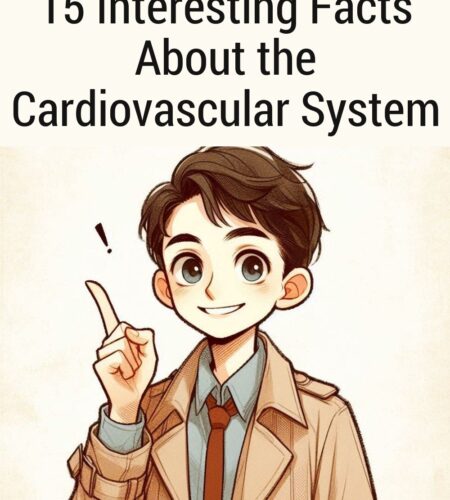Introduction:
The cardiovascular system is a complex network of organs and cells that are essential for our body’s functioning. It is responsible for circulating oxygen-rich blood to all areas of the body, enabling it to thrive and keep us alive. Our cardiovascular system is truly remarkable and we owe it our thanks for the many millions of years of evolution that have allowed it to become so mighty and powerful. Here we will be looking at 15 of the most interesting facts about the cardiovascular system that you might not know!
Fact 1: The Human Heart Beats Approximately 100,000 Times Per Day
The human heart is a remarkably strong and efficient organ, and it must be to keep up with the demands the cardiovascular system places on it. An average human heart will beat approximately 100,000 times a day at a rate of around 70 to 80 times per minute. That’s a lot of work for a single organ!
Fact 2: The Human Heart Weighs About 11 Ounces
It might surprise you to know that the heart isn’t the largest organ in the human body. It only weighs about 11 ounces and isn’t quite the size you’d expect. This is, however, more than enough to deal with the cardiovascular system’s rigorous demands.
Fact 3: The Largest Artery Is Called the Aorta
The Aorta is the largest artery in the body and is responsible for carrying oxygenated blood from the heart to all body cells and organs. It can reach up to three feet in length and an inch in diameter. Impressive, right?
Fact 4: The Blood Pressure of an Average Human is Approximately 120/80 mmHg
The blood pressure of an average human is 120/80 mmHg. This refers to the amount of force applied to the walls of the arteries as blood passes through them. High blood pressure puts you at risk of heart disease and other cardiovascular issues.
Fact 5: The Longest Vein Is Called the Inferior Vena Cava
Your largest vein is the Inferior Vena Cava. It can reach up to 150cm long and plays a very important role in the circulation of deoxygenated blood in the body.
Fact 6: Your Blood Makes up 8% of Your Body Weight
Your blood makes up 8% of your total body weight. Your vital organ functions, such as blood circulation, depend on your blood’s mass. It’s vital to stay hydrated as much of your blood is composed of water.
Fact 7: Most Blood Vessels Are Just a Single Cell Thick
Blood vessels are just a single cell thick, yet are incredibly strong and resilient towards the pressure that they have to endure.
Fact 8: White Blood Cells Are the First Line of Defense Against Disease
White blood cells are part of the immune system and they are present in our blood stream. They help protect the body against disease and they do so by destroying any harmful bacteria or viruses that enter the body.
Fact 9: Heart Failure Is One of the Most Common Cardiovascular Issues
Heart failure is a condition in which the heart is unable to pump enough blood and oxygen to the body, leading to life-threatening problems. It is one of the most common cardiovascular issues and is often caused by high levels of cholesterol or high blood pressure.
Fact 10: Platelets Help Heal Basic Wounds
Platelets are a type of cell that are found in the blood and are responsible for helping the body to heal simple wounds. They have an important role to play in the clotting of blood and this helps to plug the wound and promote healing.
Fact 11: Red Blood Cells Can Live for Up to 120 Days
Red blood cells are an important component of the blood. They are responsible for carrying oxygen around the body and can live for up to 120 days before being recycled.
Fact 12: The Heart Pumps Around 2,000 Gallons of Blood Each Day
Your heart is one of the most powerful organs in the body and it never stops working. On average the heart is able to pump around 2,000 gallons of blood through the body every single day! That’s an enormous amount of blood!
Fact 13: The Right Side of the Heart Is Responsible for Oxygenated Blood
The left side of the heart is responsible for moving oxygenated blood around the body, whilst the right side of the heart pumps out deoxygenated blood. The two sides together ensure that the oxygenated and deoxygenated blood are evenly balanced to ensure proper circulation.
Fact 14: The Human Coronary Arteries Supply Almost All of the Heart’s Blood
The coronary arteries supply the human heart with almost all of its blood. These arteries are small but incredibly important, supplying oxygen and nutrients to the cells of the myocardium.
Fact 15: The Cardiovascular System Is Regulated by the Autonomic Nervous System
The cardiovascular system is kept in check by the autonomic nervous system, which is responsible for regulating the heart rate and blood pressure. It is an incredibly important part of the body’s functioning that helps to maintain correct blood pressure and other vital processes.
Conclusion
The cardiovascular system is an important and complex system within our body that enables us to function properly. It takes up a large part of our overall health and is responsible for many of our daily functions. We hope you found this article interesting and learned something new about the human cardiovascular system. Thank you for reading.
Subscribe to our email newsletter to get the latest posts delivered right to your email.





Comments